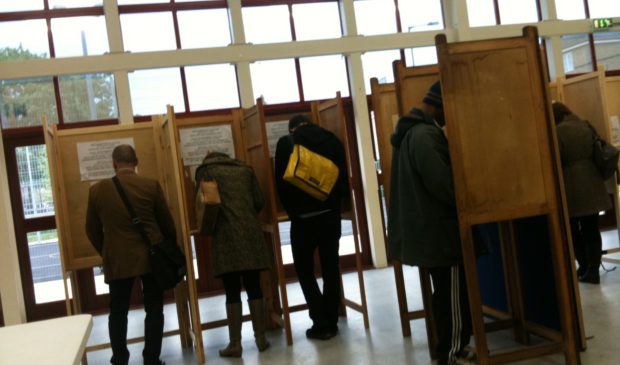STAR-Vote collapses
Wednesday, October 4, 2017 by
Caleb Pritchard Lack of interest from the private sector has sunk Travis County Clerk Dana DeBeauvoir’s plans for a proprietary new voting system.
On Tuesday, DeBeauvoir told the Travis County Commissioners Court that STAR-Vote is all but dead.
The news marked a major disruption in a process that began in 2009 with a study group convened by DeBeauvoir.
Based on the recommendation of that study, the Clerk’s Office worked with academics and state officials to develop from the ground up a brand-new digital system for conducting elections. This resulted in the Secure, Transparent, Auditable, and Reliable Voting System, or STAR-Vote.
The Clerk’s Office issued a request for proposal earlier this year to solicit bids from private partners to help build the system.
“And the 12 responders gave us ideas and proposals for the five segments of the RFP,” DeBeauvoir explained to the court. “However, when we tried to look at all of the permutations and combinations of what the 12 proposers had submitted for the five different modules, there was not one complete system that was proposed among the whole batch.”
The primary problem, she said, was her interest in making STAR-Vote an open-source system.
“The marketplace out there really does not want to build the kind of voting system that has a low-revenue model and that’s a lot cheaper for counties to own,” DeBeauvoir told journalists after her briefing. She said that two other cornerstones of STAR-Vote – better security and a paper trail – are non-negotiable and will still be achievable with private partners.
The Clerk’s Office will issue a brand new RFP later this month for a system without the open-source requirement. DeBeauvoir estimated that the approximate cost to build the new system will be about $14 million. STAR-Vote, she said, would have cost as much as $12 million, but would have avoided annual software licensing fees.
The current system the county uses, the Hart InterCivic eSlate system, cost roughly $7 million when the county adopted it in 2001. That system has seen several security augmentations over the years.
Despite the years of development, the Clerk’s Office has only spent $300,000 on STAR-Vote work. Much have that went to consultants as well as the construction of a prototype.
The Clerk’s Office had been planning to have STAR-Vote in place in time for the 2020 presidential elections. That schedule has not changed, though the revised timeline might mean the Clerk’s Office would debut the new system during the May 2020 local elections.
“That will allow us to get voters’ hands on the equipment before the presidential election which is that same year. That also lets us train staff, it lets us train election judges, basically it lets us create a sense of familiarity with the system,” Chief Deputy County Clerk Ron Morgan told the court.
But first, DeBeauvoir said the next step is to spend “at least a year” to sift through the respondents of the planned RFP.
“It’s an ambitious goal, we’re going to try our very best to make, so stay tuned, we’ll let you know if we’re going to stay on track.”
Photo by Alex Lee (originally posted to Flickr as Voting in Hackney) [CC BY 2.0], via Wikimedia Commons.
The Austin Monitor’s work is made possible by donations from the community. Though our reporting covers donors from time to time, we are careful to keep business and editorial efforts separate while maintaining transparency. A complete list of donors is available here, and our code of ethics is explained here.
You're a community leader
And we’re honored you look to us for serious, in-depth news. You know a strong community needs local and dedicated watchdog reporting. We’re here for you and that won’t change. Now will you take the powerful next step and support our nonprofit news organization?



